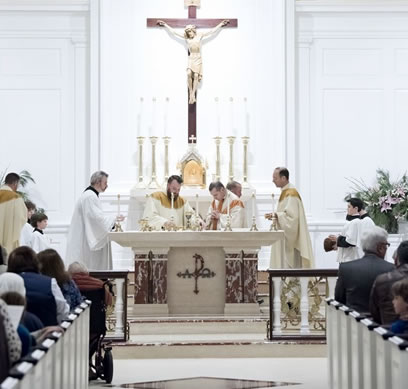Dear Brothers and Sisters in Christ,
Continued from last week…
When Catholics came to the United States, they were a minority community, often looked upon as foreign and undesirable. Political parties were a way to become more American and find protection from the rampant anti-Catholicism prevalent in the public sphere (a spirit that has never disappeared from the American political landscape, only sometimes dipped below the surface). While this may have assisted in assimilating to American culture, the cost for many Catholics has been a prioritization of party over faith. Unfortunately, we often see Catholics trying to express or justify a way that the political party agendas fit within Catholic social teaching or fundamental principles. Increasingly, candidates and platform policy items from both parties are presented to us that stand for things contrary to Catholic belief – what is problematic is that so many Catholic politicians simply embrace the platform or candidate rather than engaging it and influencing it from a place of faith. This is one manifestation of the idolatry of party and platform to which I alluded last week.
This can also manifest in a subtle yet pervasive belief that the state must take the lead on all social issues and charitable work, or that a particular government, party, or candidate is the solution to those issues. The book of Exodus, handing down divine law in the first reading today, shows us that the responsibility for social order lies with the individual first. “You shall not oppress the alien” “You shall not wrong the orphan or widow,” “You shall not extort the poor.” In the Gospel, Jesus powerfully and beautifully summarizes the whole law and the prophets, calling us to love of God and love of neighbor. If we fall into the trap of believing that a party or government will fix the social ills we see – will take care of the poor, the migrant, the oppressed, the hungry – we risk also believing that we are absolved of any personal responsibility. But the whole law and the prophets, summarized in a simple phrase, binds each of us in faith to love of God and love of neighbor. I can never be excused from this responsibility. If it is true that I cannot be excused from the responsibility for personal action, I must examine the ways in which I can take action. The first, and most obvious, is to serve the person next to me, in front of me, or wherever I meet them. The second, similarly clear, opportunity is to give of my time, talent, or treasure in support of those who can more directly work for the good of the alien, the poor, the orphan, the widow. A third way, one which is heavy on many minds and hearts at this time, is by participation in public or civic life; by exercising the right to vote. How then, ought a Catholic seeking to live out their faith in the public square, approach voting?
We read in the Gospel last week that we are to render unto Caesar what is Caesar’s, and unto God what is God’s. To illustrate this, Jesus took the coin used to pay the tax, asking whose image was stamped on the coin. To his listeners, the word “image” had instant resonance. For an image stamped on a coin pointed to a man, but for observant, believing, faithful Israelites, “image” refers to the image and likeness of God, that is, to the way in which humanity is created. What belongs to God, then, is that which is stamped with His image and likeness – every human person. While the follower of Jesus will operate in the world, their highest duty is to give to God what belongs to God, to protect what belongs to God. Whoever Caesar might be, whatever form Caesar might take, the Christian in the world bears the responsibility for that which bears the image of God: human life.
Every human life is sacred from the moment of conception to the moment of natural death. Pope Francis has said that the right to life is fundamental to all other rights, while the United States Conference of Catholic Bishops, in “Forming Consciences for Faithful Citizenship,” make clear that issues related to human life are of preeminent importance. Catholics must know and understand the fundamental dignity of the human person as the foundation for all interaction in public, civic, and political life. Recognizing the dignity of the person will allow us to embrace civility in dialogue, and exercise genuine empathy and concern for those most in need. Some of the issues related to human life fall into the category of intrinsic evils, that is, things that are evil in themselves, by their very nature. Others, are things that should be regarded as incompatible with the Gospel, even if they are not always and in every situation evil per se. Other human life issues relate to justice and prudential decisions. There may be disagreements over prudential judgments, there may be some grappling with how best to handle things that are incompatible with the Gospel, but there can never be tolerance of or allowance made for things that are intrinsically evil.
The Catholic faith cannot tell us for whom to vote, only how to form our consciences correctly so as to make the best choices possible. I encourage you to take time to read “Forming Consciences for Faithful Citizenship” which is available on the USCCB website (www.usccb.org) in a free PDF format. We do well to remember here that abortion is an intrinsic evil, and thus it should not be permitted in law. The death penalty, while not intrinsically evil, is, as Pope Francis teaches, inadmissible, and should, in general, not be applied as it is contrary to living the Gospel. There were 22 executions in 7 states in 2019, compared to over 800,000 abortions in the US in the same time period. The Church is clear that immigrants do not lose their human rights simply because they have migrated, though how to handle immigration law is a matter of prudential judgement. Nevertheless, every country, every person, has a duty to help human beings in need, and so immigration law must reflect care for the dignity and rights of migrants. Racism can never be tolerated, because unjust discrimination denies a person their human dignity, and Catholics are called to uphold and defend the dignity of every human life. There are far more issues than I have space available to write about. Remember, the Church’s teaching on this is not based on political ideals, but on the divine moral law. When an issue of intrinsic evil is on the table, a Catholic can never support that which is intrinsically evil; for example, a Catholic should never vote for a candidate because of their support for abortion. If other issues, factored together, can be considered weighty enough in proportion to the (intrinsically evil) issue, the possibility of voting for a candidate in spite of their stance that issue can be discussed and discerned. An informed conscience, taught by our faith in Jesus and His Gospel, shaped by the teachings of the Church, can then lead us into prayer for guidance before casting our votes.
If we Catholics come to know and understand the consequences of our faith more perfectly, we can be the salt and light that Jesus calls His disciples to be in the world. At no time does our Lord suggest that living as Christians will be easy – often, living our faith, will place us in contrast with prevailing currents of socio-political life, and there will, we are assured, be challenges, persecutions, and troubles. Rather than giving in to the pressures of society, we know that our faith has something to offer to our society. Our voice and our vote, influenced by the gift of our faith, can be used for the good of our society. May our faith move us beyond voting, and toward greater support for those organizations and persons who are working for truth and justice, and even more, may our faith move us to concretely put our faith into action in our own service and personal efforts on behalf of a world in need.
Peace,
Fr. Sam

